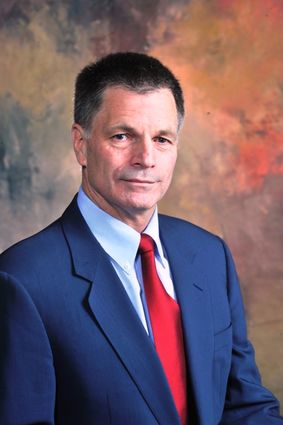State Treasurer takes Capital tour of state
January 16, 2018
WORLAND – State Treasurer Mark Gordon (R-Kaycee) spent Friday on a Capital Tour of northern Wyoming, speaking with banking officials about changes to the state investment services, and used his time to highlight improvements with Wyoming's unclaimed property division.
According to the office of the treasurer, unclaimed property is money that is left behind and turned over to the state to hold for the rightful owners. It includes but is not limited to utility deposits, unpaid wages, insurance proceeds, securities, savings and checking accounts. The Unclaimed Property Division receives new properties every year, and in 2017, $8 million was received and $6.5 million was successfully returned to the citizens of Wyoming. The division is currently holding approximately $60 million in unclaimed properties from previous years.
"We've changed the process a bit to allow for unclaimed property to find its owner more efficiently," said Gordon, explaining that "we previously required three separate proofs of residence, whether the property is from in-state or outside Wyoming, but we're working toward a software solution to verify information, and make notification available over our web site."
Gordon explained that the average unclaimed property is around $500, although the state has returned as much as $70,000 to one claimant, and that there are unclaimed cases in every county of the state.
INVESTMENTS
During his stop in Worland, Gordon also spoke about other issues.
Under legislation introduced in December for consideration, the state treasurer would be authorized to invest up to 70 percent of both the state's permanent fund and investment account in equities, including stocks of corporations.
"Right now two-thirds of the state's portfolio can't be appropriated, so this would help with that somewhat," said Gordon. "The state constitution prohibits investment in anything but bonds, and currently we have $20 billion in the state's portfolio invested across nine funds. This legislation would allow the state to invest in stocks with more return."
"We're looking at allowing local governments [such as Worland] to do the same," said Gordon. "this has been a crying need for local governments for years, as their return has only been around 1 percent [on its investment]."
Gordon explained that the state has spent around $475 million on outside investment services, primarily in broker fees, and that moving that in-state would save a significant amount.
"Reduced broker fees by bringing that in-house, and creating more practical portfolios [for the state] would result in about an $8 million savings the first year," said Gordon. "It would give us more flexibility, a better return and make everything more transparent.
While the state still has to grapple with a budget deficit caused by a decrease in mineral wealth, Gordon believes simple changes to the investment structure cane keep the state moving ahead.
"Right now school funding is our biggest issue. If we change asset allocations we will create more funding, and we should be able to offset that gap," noted Gordon.





